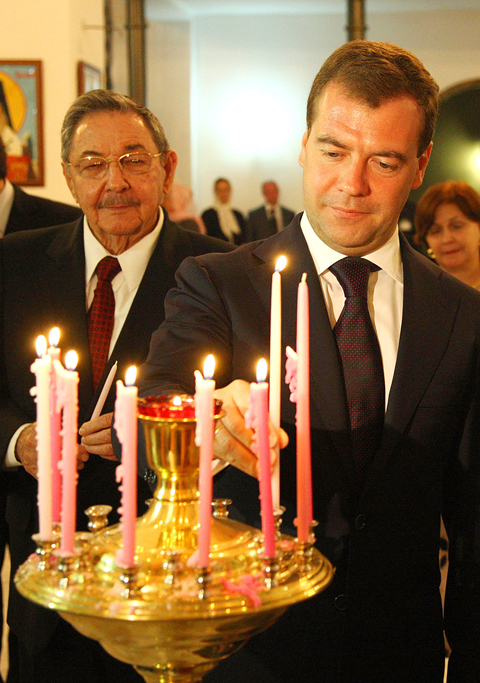Russian President Dmitry Medvedev visited old Cold War ally Cuba on Thursday, spending hours with President Raul Castro on the final leg of a Latin America tour designed to increase Moscow’s profile in a region long dominated by the US.
Medvedev arrived in Havana from Venezuela, where he met socialist President Hugo Chavez and agreed to help the oil-rich South American country start a nuclear energy program.
Russian officials deny that Medvedev’s four-nation trip to Latin America is meant to provoke the US, but the voyage included meetings with Washington’s staunchest opponents in the region. Chavez and Medvedev met aboard a Russian warship docked in a Venezuelan port ahead of joint military exercises.

PHOTO: AFP
Medvedev said Russia was stepping up its political ties in Latin America and said Moscow must aggressively seek to shore up its economic position in the region.
“One must admit, to put it simply, we have never had a serious presence here — these have been just episodes,” he told reporters in Cuba, referring to Latin America as a whole.
“We visited states that no Russian leader, and no Soviet leader, ever visited. This means one thing: that attention simply was not paid to these countries,” he said.
“And in some ways we are only now beginning full-fledged, full-format and, I hope, mutually beneficial contacts with the leaders of these states — and, correspondingly, with the economies of these states. We should not be shy and fear competition. We must bravely enter the fight,” he said.
The visit comes at a time when Russia is angry at US plans to build a missile-defense system in Eastern Europe.
The upper chamber of the Czech Parliament on Thursday approved a deal to accept a US missile defense installation. Russia fiercely opposes the plans, saying US military installations in former Soviet satellites threaten its security.
In Cuba, Raul Castro did not greet the Russian president at the airport, but he was by his side just a short time later, accompanying Medvedev to the monument of independence hero Jose Marti and to a recently inaugurated Russian Orthodox Church.
The pair also met privately, then spoke again surrounded by top advisers as part of “official conversations” at the storied Palace of the Revolution, discussing the global financial crisis and other topics.
“We discussed the development of our relations, in the economic sphere and the sphere of military-technical cooperation” — arms sales — “as well as security and regional cooperation,” Medvedev told reporters.
The 77-year-old Castro — who succeeded his brother Fidel as president in February — served as Cuba’s defense minister for nearly five decades and enjoyed an excellent relationship with Soviet defense officials.
A steadfast communist who visited the Soviet Union often, Castro has long been thought of as a great admirer of Moscow and its policies.

POLITICAL PRISONERS VS DEPORTEES: Venezuela’s prosecutor’s office slammed the call by El Salvador’s leader, accusing him of crimes against humanity Salvadoran President Nayib Bukele on Sunday proposed carrying out a prisoner swap with Venezuela, suggesting he would exchange Venezuelan deportees from the US his government has kept imprisoned for what he called “political prisoners” in Venezuela. In a post on X, directed at Venezuelan President Nicolas Maduro, Bukele listed off a number of family members of high-level opposition figures in Venezuela, journalists and activists detained during the South American government’s electoral crackdown last year. “The only reason they are imprisoned is for having opposed you and your electoral fraud,” he wrote to Maduro. “However, I want to propose a humanitarian agreement that

ECONOMIC WORRIES: The ruling PAP faces voters amid concerns that the city-state faces the possibility of a recession and job losses amid Washington’s tariffs Singapore yesterday finalized contestants for its general election on Saturday next week, with the ruling People’s Action Party (PAP) fielding 32 new candidates in the biggest refresh of the party that has ruled the city-state since independence in 1965. The move follows a pledge by Singaporean Prime Minister Lawrence Wong (黃循財), who took office last year and assumed the PAP leadership, to “bring in new blood, new ideas and new energy” to steer the country of 6 million people. His latest shake-up beats that of predecessors Lee Hsien Loong (李顯龍) and Goh Chok Tong (吳作棟), who replaced 24 and 11 politicians respectively

Young women standing idly around a park in Tokyo’s west suggest that a giant statue of Godzilla is not the only attraction for a record number of foreign tourists. Their faces lit by the cold glow of their phones, the women lining Okubo Park are evidence that sex tourism has developed as a dark flipside to the bustling Kabukicho nightlife district. Increasing numbers of foreign men are flocking to the area after seeing videos on social media. One of the women said that the area near Kabukicho, where Godzilla rumbles and belches smoke atop a cinema, has become a “real

‘WATER WARFARE’: A Pakistani official called India’s suspension of a 65-year-old treaty on the sharing of waters from the Indus River ‘a cowardly, illegal move’ Pakistan yesterday canceled visas for Indian nationals, closed its airspace for all Indian-owned or operated airlines, and suspended all trade with India, including to and from any third country. The retaliatory measures follow India’s decision to suspend visas for Pakistani nationals in the aftermath of a deadly attack by shooters in Kashmir that killed 26 people, mostly tourists. The rare attack on civilians shocked and outraged India and prompted calls for action against their country’s archenemy, Pakistan. New Delhi did not publicly produce evidence connecting the attack to its neighbor, but said it had “cross-border” links to Pakistan. Pakistan denied any connection to